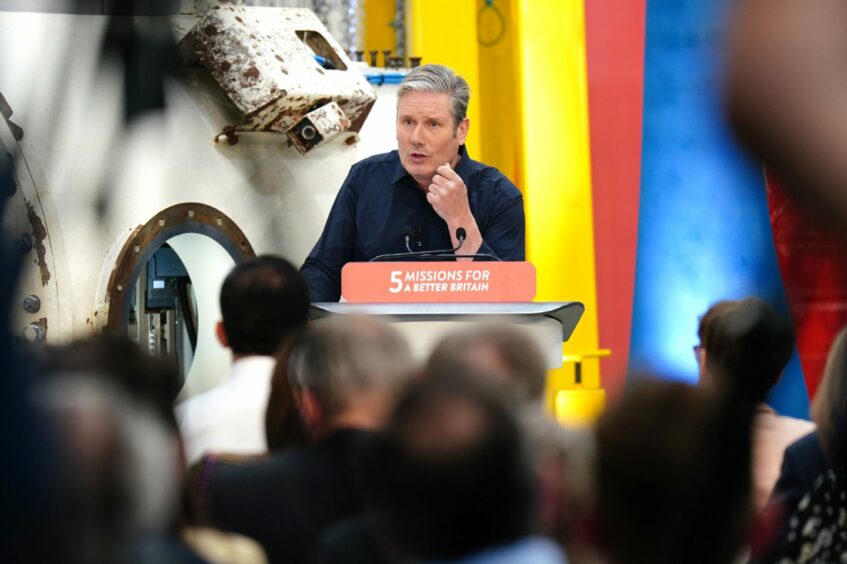 © Jane Barlow/PA Wire
© Jane Barlow/PA Wire Keir Starmer unveiled ambitious Labour plans for a ‘national mission’ to accelerate the roll out of clean energy, but north-east business leaders said the policy is “overshadowed” by ongoing uncertainty around the future of North Sea oil and gas.
Speaking at a launch event in Leith, Edinburgh on Monday, Mr Starmer announced his “national mission on clean energy” which would see the UK accelerate plans for a net-zero electricity sector to 2030 – five years ahead of current government policy.
Yet despite a continued Labour vow not to impose a “cliff edge” on North Sea oil and gas production, north-east firms said he had failed to provide much-needed assurances on the future of the sector.
50,000 Scottish jobs
Labour’s clean energy drive would create half a million new jobs, 50,000 of which would be in Scotland, alongside plans for a new state-backed developer GB Energy, also headquartered north of the border.
To accomplish this Mr Starmer promised a suite of policy changes ranging from “planning reform, procurement, long-term finance, R&D, a strategic plan for skills and supply chains”, and the creation of new National Wealth Fund to invest in growth projects such as battery factories, and clean steel plants.
He rebuffed accusations that the party had scaled back plans to borrow £28bn per year to invest in green infrastructure and jobs, saying he was “doubling down, not backing off”.
Meanwhile Labour said the roll out of renewables would also help shave £1,400 a year off household energy bills.
Drilling licences will continue
Crucially, Mr Starmer confirmed that Labour’s ban on new North Sea licences would only affect new exploration, while drilling licences for existing fields would continue to be issued.
In the meantime, he reaffirmed that any licences granted between now and the next election would be honoured – a stance that would likely guarantee development of the Rosebank field, approvals for which are thought to be imminent.
It follows reports this weekend that developer Equinor has been given assurances over the fate of the field, should Labour win power at the next election.
Introducing Mr Starmer ahead of his speech, Scottish Labour leader Anas Sarwar added: “Our opponents want to suggest that our plans are in conflict with the ambitions of the energy sector in the north east of Scotland. Nothing could be further from the truth.
“So let me say this clearly: there will be no cliff edge. There will be no turning off the taps. Oil and gas will play a significant role in our energy sector for decades to come.
“But what people working in our oil and gas industry need is a government that backs them.”
Fielding questions during a media briefing later, he affirmed that the announcement “is not a plan that is bad for Aberdeen” and said both leaders would visit the north east to discuss the policy in the “not-too-distant” future.
Green drive ‘overshadowed’ by oil and gas plans
However, north-east business leaders said the announcement would do little to reassure oil firms, and would jeopardise investment in the energy transition.
Ryan Crighton, policy director at Aberdeen & Grampian Chamber of Commerce (AGCC), said: “Labour’s big ambition on renewables, grid infrastructure and de-risking new technologies is hugely welcome. We fully support both the scale and direction of their ambition on these crucial issues.
“However, it is completely overshadowed by a position on oil and gas which is not grounded in the realities of the energy transition and will drive away they very companies they want to partner with to make the UK a clean energy superpower.
“Their failure to meaningfully engage with the people, companies and regions delivering the energy transition is evident in this naïve policy, which has now placed jobs, investment and energy security at risk.”
AGCC called on all parties to adopt “an explicit position on hydrocarbons” that would favour North production if the alternative is imported oil and gas which may carry a greater carbon impact.
“It’s simple, it’s measurable, and it ensures that the fossil fuels that we do use are extracted with minimum impact on our climate goals.”
‘Too much, too soon’
Other industry sources said Labour’s position offered “no certainty” for the 76 companies who have applied for more than 100 new exploration permits as part of the current 33rd Licensing Round.
“Far from providing investors with confidence to commit to the UK, or reassuring the thousands of oil and gas workers concerned for their livelihoods under a future Labour government, Sir Keir Starmer’s baffling position only raises more questions than it answers,” they said.
“The fact Labour don’t currently plan to block licences from being granted during the next 12 months provides no assurance to companies considering investing. Quite the opposite.”
The head of trade body Offshore Energies UK (OEUK) David Whitehouse welcomed the support for the UK’s 200,000 oil and gas workers, but said the policy to end exploration after the next election was “too much too soon.”
“It would be damaging for the industry, for consumers and for the UK’s net zero ambitions.
“The figures are clear. The UK has 283 active oil and gas fields but 180 will shut down by 2030. If we don’t replace them with new ones, then production will decline much faster than we can build low carbon replacements. It means the UK will become increasingly reliant on imports.”
He said North Sea supplies were “essential” to energy security, adding that: “We need new licences just to slow the natural decline in current levels of production while we build the low carbon systems of the future.”
‘Plenty of appetite’ for ambitious transition
Green energy backers were enthused by the plans, but cautioned that significant policy changes were needed rapidly if Labour’s 2030 goal was to be met.
Simon Virley, vice chair and head of energy and natural resources at KPMG agreed the plans were “certainly ambitious.”
“There is plenty of appetite from the private sector to invest in renewables and accelerate the transition, if the right long-term policies are in place. The problem is not the lack of investment. It is the non-financial barriers, like planning, consenting and grid connections that need to be tackled as a matter of urgency.
“As a result of these delays, any new offshore wind project started now would not be operational until the mid-2030s at the earliest. Labour will have to find ways quickly to tackle these non-financial barriers if it wants to accelerate the transition to a Net Zero Power System.”
RenewableUK chief executive Dan McGrail welcomed the plans for a faster rollout of green energy, but warned that the benefits of technologies like onshore wind would be missed unless a de-facto in England was removed.
“This will involve early engagement and close consultation with communities and local authorities – many of which are telling us that that they want to put forward their own projects.
“Overall, it’s clear that delivering Labour’s renewable energy ambitions will require considerable reforms to planning, grid development, regulatory frameworks and skills policy. We need to address these issues as a matter of urgency, so welcome clarity on them.”
Pinsent Masons partner and energy specialist Gareth Phillips pointed to planning reform as a major barrier.
“There has been such a fixation on new energy generation that current infrastructure continues to be neglected,” he noted.
“Improvements to existing grid network, transmission and supply chains would be an effective first step for a government grappling with domestic energy supply, but they first need to ensure that regulators have sufficient resource to process necessary red tape quicker.”


